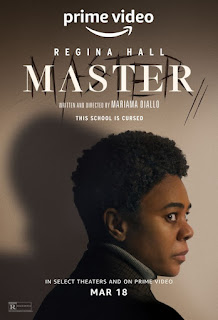"Master" creepy, intelligent social horror that hits hard
Master (2022)
Writer-director Mariama Diallo’s first feature “Master” has more to say than just “Racism is bad,” and it’s more than just “‘Get Out’ at an Ivy League school.” No doubt, this film shares DNA with Jordan Peele’s feature debut, but it’s wholly its own, finding insidious horror in institutional racism that has yet to go anywhere. Thematically provocative and as subtle as it needs to be to remain compelling, “Master” hits hard.
Three Black women at the elite Ancaster College, built on a gallows hill in New England, are at the center of this socially searing horror film. As the new incoming house “master,” Professor Gail Bishop (Regina Hall) is faced with a lot of pressure to bring about change, being the first Black woman to hold such a prestigious position. Freshman student Jasmine Moore (Zoe Renee) is full of promise and optimism, until she begins hearing about centuries-old accusations of witchcraft and the haunted backstory of Jasmine’s assigned dorm room, where Ancaster’s first undergraduate of color hanged herself. Over a failing grade, Jasmine then clashes with outspoken Black lit professor Liv Beckman (Amber Gray), who’s close friends with Gail and in the middle of her own tenure review by the predominantly white faculty members (including Talia Balsam, Bruce Altman, and Jennifer Dundas). As Gail tries living up to her role and supporting both Jasmine and Liv, something supernatural takes hold, or is it just the unfortunate status quo?
Being a Yale undergraduate herself, writer-director Mariama Diallo seems to bring her own higher-learning experience to “Master” with painful honesty. The Black experience of feeling “other” exists in all forms, ranging from racial preconceptions and micro-aggressions to the actual existence of a faculty position called “master” (or, the dean of students) whose house still has a mammy cookie jar. There's even a development involving "blackfishing" that adds to the cumulative unease. The three performances by Regina Hall, newcomer Zoe Renee, and Amber Gray are all strong and nuanced, delineating three distinct, fully formed character perspectives. Diallo makes some smart editing choices to efficiently move her multi-tiered story along, and her script carefully sidesteps being didactic when addressing social issues. Her direction is also creepy in its dread-mounting restraint, like a silhouette on a building that follows Jasmine back to her dorm. The same goes with when the menace is more overt and of the real world, like Jasmine being surrounded by her white peers at a frat party; the lyrics of a rap song they're dancing to and the red lighting Diallo employs make for a potently chilling combination.
“Master” doesn’t actually conclude with a traditional bang or even a cathartic resolution, but its final shot is just right and more than satisfying, literalizing the title of Jordan Peele's film. Whether or not Mariama Diallo fully commits to familiar haunted-dorm trappings is all part of her master plan of blurring a nightmarish reality with what is just an abstract nightmare. Red herrings decidedly abound, with black-cloaked figures spooking the campus and an Amish-type community still living in the area, but no scare tactics involving maggots in the walls, nightly campus tours, and witching-hour frights ever undermine the bigger ideas at hand. As one character says to comfort another, “It’s not ghosts. It’s not supernatural. It’s…America,” the truth that racism is so ingrained in this country (even a liberal college that prides itself on an inclusive future) ends up being more disturbing than anything else going bump in the night. Bringing a new, pointed voice to the genre (and perhaps more material to discuss for a follow-up to 2019’s essential documentary “Horror Noire: A History of Black Horror"), “Master” is bold, intelligent, and creepy.
Grade: B +
Amazon Studios is releasing “Master” (91 min.) in select theaters and to streaming on Prime Video on March 18, 2022.










Comments
Post a Comment